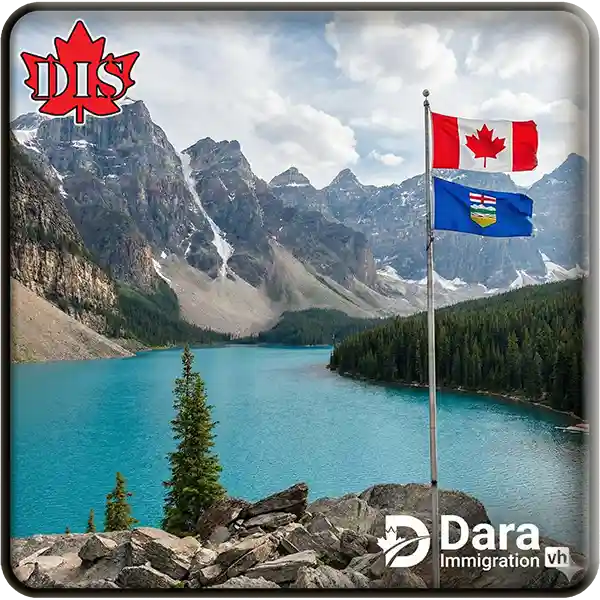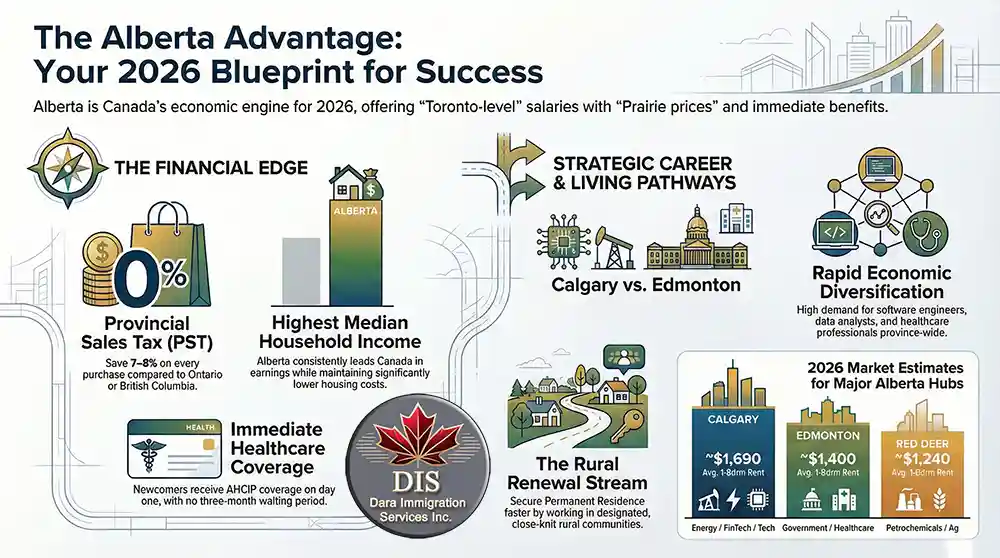Alberta
Alberta Overview 2026-2027
To choose Alberta is to choose the economic engine of Canada, where high incomes, low taxes, and the majestic Rocky Mountains converge. For the thousands of newcomers arriving in 2026, this province represents a unique opportunity: the ability to earn a “Toronto salary” while paying “Prairie prices” for housing.

However, this province is not just about oil and gas anymore. With a booming tech sector in Calgary and a robust Alberta Advantage Immigration Program (AAIP) targeting healthcare and rural communities, the province is actively recruiting skilled talent. Yet, the “boom and bust” economy and extreme winters require preparation.
At Dara Immigration Services, we help you look past the headlines to understand the real opportunities on the ground. This guide is your blueprint to settling in this province successfully, ensuring your move aligns with your career and family goals.
The Alberta Advantage
Alberta is the only province in Canada with no Provincial Sales Tax (PST). While Ontarians pay 13% tax on goods and British Columbians pay 12%, Albertans pay only the 5% federal GST. This single factor creates significant daily savings for families.
Furthermore, this province consistently boasts the highest median household income in the country. When combined with housing costs that are significantly lower than Vancouver or Toronto, the “Alberta Advantage” offers a path to homeownership that is disappearing elsewhere.
Quick Facts: Alberta at a Glance
- Capital City: Edmonton.
- Largest City: Calgary (Population ~1.7 Million).
- Population: Approx. 4.9 Million (2026 Estimate).
- Tax Advantage: 0% Provincial Sales Tax (PST).
- Key Immigration Stream: Alberta Advantage Immigration Program (AAIP).
- Minimum Wage: $15.00 per hour.
Major Cities & Economies
To succeed in Alberta, you must choose the city that fits your industry. The province is split between two major urban rivals and a network of thriving secondary cities.
Calgary
The corporate headquarters of the west, Calgary is a modern, cosmopolitan city located just 90 minutes from the Rocky Mountains.
Economy & Labour Market
- Key Industries: Energy (Headquarters of major oil firms), FinTech, Agribusiness, and Transportation.
- Employment Outlook: Calgary is rapidly diversifying. The tech sector is booming, with high demand for software engineers and data analysts to support the digital transformation of the energy sector.
- Lifestyle & Culture: “Cowboy Culture” meets corporate ambition. The city is famous for the Calgary Stampede but also features a vibrant downtown arts scene and extensive bike path networks.
- Cost of Living: Rising but competitive. While one-bedroom rents have stabilized around $1,690, this is still $900 cheaper per month than Vancouver.
Edmonton
The provincial capital is known as “Canada’s Festival City” and offers a more stable, government-driven economy.
Economy & Labour Market
- Key Industries: Public Sector (Government), Healthcare, Education (University of Alberta), and Manufacturing.
- Employment Outlook: Jobs here are less volatile than in Calgary because the government and education sectors provide steady employment even during oil price dips.
- Lifestyle & Culture: Community-focused and unpretentious. Edmonton winters are harsher, but the city embraces them with unrivaled winter festivals and the massive West Edmonton Mall.
- Cost of Living: Very Affordable. One-bedroom rents average $1,400, making it one of the most affordable major cities in North America.
Secondary Cities & Rural Regions
Alberta is aggressive in recruiting immigrants to smaller towns through the Rural Renewal Stream.
Red Deer, Lethbridge & Fort McMurray
- Economy: These cities are hubs for agriculture, petrochemicals, and oil sands extraction.
- Immigration Opportunity: Many of these communities have “Designated Community” status under the AAIP, meaning they can endorse candidates for Permanent Residence who have a local job offer, bypassing some competitive barriers of the federal system.
- Lifestyle: Quiet, family-oriented, and close-knit. Commutes are negligible (10-15 minutes).
Cost of Living & Climate (2026)
Use this table to compare your potential new home. Note the drastic rent difference compared to other provinces.
| City / Region | Avg Rent (1-Bdrm) | Key Industry | Avg Winter Low (Jan) | Immigration Benefit |
| Calgary | ~$1,690 | Energy / Tech | -12°C | High Wages |
| Edmonton | ~$1,400 | Gov / Health | -16°C | Affordability |
| Red Deer | ~$1,240 | Petrochemicals | -14°C | Central Location |
| Lethbridge | ~$1,365 | Agriculture | -8°C | Rural Renewal Stream |
| Banff/Canmore | ~$2,200+ | Tourism | -10°C | Tourism & Hospitality Stream |
Note: Rents are early 2026 market estimates. Banff housing is extremely scarce and often tied to employment.
“How-To” Guide: Settling in Alberta
Your path to becoming an Albertan involves specific provincial steps.
Pre-Arrival: Research the AAIP
- Check the Streams: Determine if you qualify for the Alberta Opportunity Stream or the Rural Renewal Stream.
- Prepare Documents: Alberta is strict about credential assessment. Ensure your ECA (Educational Credential Assessment) is current.
Your First Week: Health & Driving
- Apply for AHCIP: Good news—This province has no waiting period for health coverage. Apply for the Alberta Health Care Insurance Plan immediately upon arrival with your work permit (must be valid for 6+ months).
- Transfer Driver’s License: Visit a Registry Agent. If you are from a country with a reciprocal agreement, you can swap your license immediately.
Long-Term: Managing Finances
- Budget for Utilities: While taxes are low, utility bills (heating/electricity) in this province can be high due to deregulated fees and cold winters. Budget $300+ per month in winter.
- Save for a Down Payment: With Edmonton homes averaging $400k-$500k, homeownership is a realistic 3-year goal for many newcomers.
Challenges for Newcomers in Alberta
To succeed in Alberta, you must be prepared for two main realities.
Challenge #1: The Economy Fluctuation
- The Reality: Alberta’s economy is historically tied to oil prices. When oil is up, jobs are plentiful; when it crashes, layoffs occur.
- The Strategy: Try to secure employment in recession-resistant sectors like Healthcare, Education, or Technology, or maintain a robust emergency savings fund.
Challenge #2: The Winter
- The Reality: It is not just cold; it is long. Temperatures can drop to -40°C during “Deep Freeze” weeks.
- The Strategy: Invest in a block heater for your car (essential for starting it in winter) and buy high-quality thermal gear. Embrace winter sports to stay active.
Frequently Asked Questions (FAQ)
- Is healthcare free in Alberta for immigrants?
Yes. If you have a valid work permit of 6 months or more, or are a Permanent Resident, you are eligible for AHCIP coverage from your date of arrival. There is no 3-month waiting period like in BC or Ontario.
- What is the “Rural Renewal Stream”?
This is a specific stream under the AAIP that allows designated rural communities to recruit newcomers. If you get a job offer from an employer in one of these towns and receive a community endorsement, you can apply for PR.
- Do I need a car in Alberta?
In most cases, yes. While Calgary and Edmonton have light rail systems (C-Train and LRT), the cities are sprawling. A car is often essential for daily errands and commuting, especially in winter.
- Is the cost of living really lower than Ontario?
Yes. Between the lack of Provincial Sales Tax (saving you 8% on many purchases compared to Ontario) and significantly lower housing costs, your purchasing power is much higher in this province.
- What is the “Alberta Opportunity Stream”?
This is a pathway for foreign workers who are already working in this province. It requires a valid work permit and a job offer in an eligible occupation. It is a popular route for PGWP holders.

Professional Immigration Assistance
Alberta offers some of the most accessible immigration pathways in Canada, particularly for those willing to live outside the major cities. However, programs like the AAIP have strict quotas and intake periods that close quickly.
Don’t miss your window of opportunity. Contact Dara Immigration Services today to build a strategy that works for you.
Disclaimer: This article provides general information regarding settlement and immigration in Alberta. It does not constitute legal advice.
Download:
Download the bulletin of Alberta as a PDF.
Download “Alberta-Bulletin-2026-2027.pdf” Alberta-Bulletin-2026-2027.pdf – Downloaded 31 times – 1.61 MB